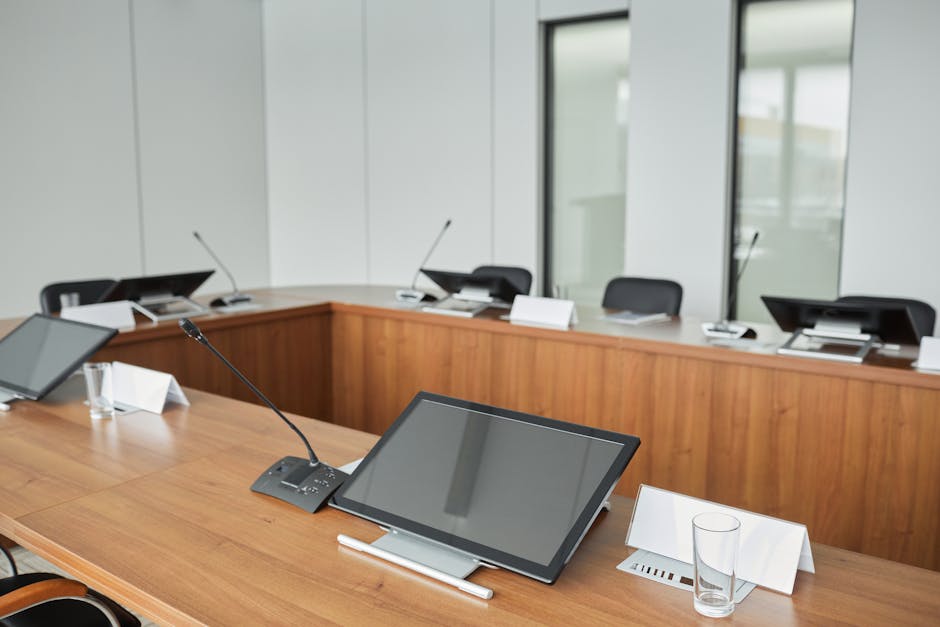Maximizing Campus Resources: The Power of Meeting Hall Management
"Explore the benefits of implementing robust meeting hall management solutions in colleges and universities. Learn how these systems streamline booking processes, increase resource visibility, and provide valuable data for future planning, ultimately enhancing the campus experience for both staff and students. "

Maximizing Campus Resources: The Power of Meeting Hall Management
In today's dynamic higher education landscape, efficient resource management is crucial for creating a productive and engaging campus environment. One area where many institutions are finding significant improvements is in the management of meeting halls and shared spaces. Let's explore how implementing effective meeting hall management solutions can transform campus operations and enhance the overall experience for students and staff alike.

The Benefits of Streamlined Meeting Hall Management
Enhanced Booking Processes
Gone are the days of cumbersome spreadsheets and confusing manual booking systems. Modern meeting hall management solutions offer a streamlined approach to reserving spaces, reducing administrative burden and minimizing conflicts. By implementing a digital booking system, universities can:
- Eliminate double-bookings and reduce scheduling conflicts
- Automate abandoned meeting protection to maximize space utilization
- Provide real-time visibility of available resources to all users
Increased Flexibility and Accessibility
College life is characterized by ever-changing schedules and diverse needs. A robust meeting hall management system supports this flexibility by:
- Offering real-time updates on room availability
- Enabling ad-hoc bookings for impromptu meetings or study sessions
- Providing clear information on room capacities and available amenities
This level of accessibility empowers students and staff to make the most of campus facilities, fostering a more productive and collaborative environment.
Data-Driven Decision Making
One of the most valuable aspects of digital meeting hall management is the wealth of data it provides. By tracking usage patterns and preferences, universities can:
- Identify high-demand spaces and underutilized areas
- Make informed decisions about future facility investments
- Optimize resource allocation based on actual usage data
This data-driven approach ensures that campus resources are aligned with the needs of the community, leading to more efficient use of space and budget.
Implementing Effective Meeting Hall Management: Best Practices
To maximize the benefits of a meeting hall management system, consider the following best practices:
1. Clear Communication of Policies
Establish and communicate clear guidelines for booking and using meeting spaces. This includes:
- Reservation procedures and time limits
- Expected etiquette for space use and clean-up
- Consequences for policy violations
By setting clear expectations, you can ensure smoother operations and better resource management.
2. Utilize Digital Room Displays

Implement digital displays outside meeting rooms to provide at-a-glance information about current and upcoming reservations. These displays can:
- Show real-time availability and scheduling information
- Allow for impromptu bookings or check-ins
- Display room features and capacity information
Digital room displays enhance visibility and make it easier for users to find and utilize available spaces efficiently.
3. Monitor and Optimize Space Usage
Regularly review usage data to identify patterns and areas for improvement. This might involve:
- Upgrading underutilized spaces to make them more attractive
- Adjusting room layouts or equipment based on user feedback
- Implementing a flexible workplace strategy to accommodate changing needs
By staying attuned to how spaces are being used, you can continually refine your meeting hall management approach for optimal results.
4. Invest in User-Friendly Software
Choose a meeting hall management solution that is intuitive and easy to use for both administrators and end-users. Look for features such as:
- Mobile app integration for on-the-go bookings
- Integration with existing calendar systems
- Customizable reporting and analytics tools
A user-friendly system will encourage adoption and maximize the benefits of your investment.
5. Provide Comprehensive Room Information

Ensure that users have access to detailed information about each meeting space, including:
- Room capacity and layout options
- Available technology and equipment
- Accessibility features
By providing this information upfront, you can help users select the most appropriate space for their needs, reducing the likelihood of last-minute changes or unsuitable bookings.
The Future of Campus Resource Management
As technology continues to evolve, the possibilities for meeting hall management in higher education are expanding. Integrating visitor management systems with room booking software can enhance security and streamline guest access to campus facilities. Additionally, the rise of hybrid work and learning models is driving the need for more flexible and adaptable spaces that can accommodate both in-person and remote participants.
By embracing these technological advancements and implementing robust meeting hall management solutions, universities can create more efficient, flexible, and user-friendly campus environments. This not only improves the day-to-day experience for students and staff but also positions institutions to better adapt to the changing landscape of higher education.
In conclusion, effective meeting hall management is more than just a convenience—it's a strategic tool for enhancing campus operations, improving resource utilization, and fostering a more collaborative and productive academic community. As we look to the future of higher education, the smart management of shared spaces will undoubtedly play a crucial role in shaping successful and dynamic learning environments.
Want to learn more about Room Booking?
Explore our complete guide with more articles like this one.


